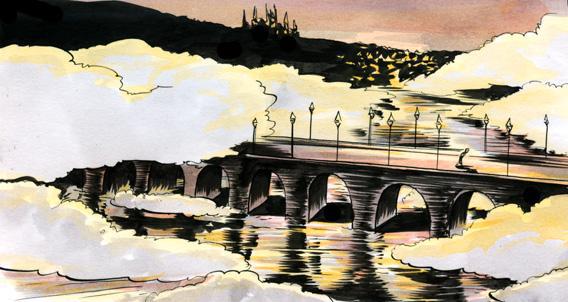Some of the longest novels are those in which not much happens. James Joyce’s Ulysses takes place over the course of a fairly ordinary day. Henry James’ already lengthy novels grew increasingly protracted as he went on—but not more eventful. Dare someone to summarize Thomas Mann’s The Magic Mountain. Or don’t, actually—you’ll get terribly bored, despite the brilliance of that novel. As a character in Caleb Crain’s new book, Necessary Errors, says: “Nothing whatever happens for pages and pages, and one doesn’t mind somehow.”
The same can be said of Crain’s novel, his first. At 472 pages, it’s not quite a tome, perhaps, but it recalls the dreamy pacing of Henry James or Elizabeth Bowen, herself a great reader of James (both come up in Necessary Errors). It takes place over the course of a year in Prague, just after the Velvet Revolution, and follows the daily meanderings of Jacob Putman, a young gay man newly out of Harvard. Jacob is trying postgraduate life abroad, teaching English at a local language school. His circle of Prague friends consists largely of his co-teachers, fellow expats testing a precariously post-Communist Prague while they test themselves as new adults. “Do you ever wonder what you’ll be some day?” they ask one another. No one seems able to give a straight answer.
Necessary Errors is a bildungsroman, but it’s about the coming of age of these friends as well as Jacob, who needs them badly. Canceled plans invariably leave him feeling desolate, and the great euphoria of his time in Prague lies significantly in the fact that it is spent together. Jacob and his friends—elegant Melinda, ironic Carl, pettish Annie, cryptic Kaspar—meet in bars, visit monuments, discuss fiction, discuss life, are frequently drunk. There is, in fact, a general haze that surrounds the novel (and perhaps your early 20s as well). If nothing really happens, it does so deliberately.
The “nothing” that happens is, in a sense, the central story of Necessary Errors—though Jacob, who has come to Prague with the hope of writing fiction, worries that not enough is taking place. He begins to fear, in fact, that his time there might not be merely a “digression,” but actually a mistake. Less than a year after Václav Havel’s election, and Jacob already feels as though he has “missed” Prague—plus he’s not getting any writing done. This fear is the central misunderstanding in Necessary Errors, one that is borne partly out of youth, partly out of a capitalist American competitiveness and desire for product. Jacob’s year in Prague—call it a digression, a mistake, or simply an escape—is finally indispensible to his writing, and to who he becomes. And Crain’s ability to keep our interest without an obvious narrative arc, to make us care, intensely, about his characters without any cat-saving or cliffhangers, is what makes the novel feel like a new sort of model for contemporary fiction.
Necessary Errors isn’t divided into chapters, but follows instead a three-part structure. And the novel is far from experimental. Crain’s characters are characters; each possesses his or her own intractable voice, and the dialogue is fervently alive and frequently hilarious. (“I’m kind of a weeper, aren’t I,” acknowledges Jacob at one point, midtears. “And you’re sort of an asshole.” “Is tea gay in America?” someone asks him elsewhere in the book. “Kind of,” he replies.) The title nods to W.H. Auden’s “1929,” a poem that was itself titled after one of Auden’s years abroad. In the Auden poem—semi-autobiographical and dedicated to Christopher Isherwood, another of Crain’s influences—the speaker muses on his time in Berlin while also referencing the Wall Street crash occurring back in America. Like Necessary Errors, “1929” is about growing up in a changing, cosmopolitan age:
“And as foreign settlers to strange country come,
By mispronunciation of native words
And by intermarriage create a new race
And a new language, so may the soul
Be weaned at last to independent delight.”
In a foreign land, mispronunciation is inevitable, and speaking there makes “choice seem a necessary error,” as Auden lyrically puts it. Jacob’s story exemplifies how some choices, even “errors,” feel retrospectively necessary, if not also inevitable. They become part of one’s narrative. While he’s in Prague, though, Jacob interprets mistakes as extraneous (or the extraneous as mistakes), rather than as integral to his story.
He is, like many of us in our early adult lives, frightened of exceeding an imagined quota of errors, and continuously muses over his actions, however minute. As a gay man, his radar for the subtleties in social interactions is already heightened—an attribute the third-person narrator reflects on in an early section of the book:
“In most of the men in a gay bar there is a greater responsiveness than is usual in the world outside, and though most of them make it a piece of strategy to restrain their response, and though the elements composing it are more often subtle than not—a shift of weight, an extra blink of the eyes, an effort not to look at something that naturally draws attention—its presence is palpable; the room vibrates with it.”
Again and again, Jacob tries to freeze a moment in order to scrutinize it from all angles—but that only magnifies any potential errors found therein. Jacob is afraid of stillness, even while aware that it is exactly what he will eventually need to write the story he’s been meaning to write. At one point “it occurred to Jacob that a pause might be mistaken for complicity.” It doesn’t occur to him until much later that such pauses—a potential moment for mistakes—might finally be necessary.

Courtesy of Liza Johnson
Jacob seems to fear these moments in part because he does not see how one can make a story—either for himself, or for hypothetical future readers—out of scenes of contemplation. During writing workshops with his friends, Jacob, in an uncharacteristically aggressive outburst, declares his hatred of postmodernism. Thinking the refractive, self-winking outfit of postmodernism a sham, he has no interest in a story that only knowingly comments on itself. Jacob obviously has not read Necessary Errors—simultaneously “postmodern” and “old-fashioned,” and very much its own thing. (Sometimes, it’s as though Crain’s protagonist is trying to analyze the narrative he’s embedded in—to anticipate its ending—even before it’s told.) In one of the novel’s most feeling moments, Jacob learns of the suicide of a friend, Meredith, back in the states. The narration suddenly pulls back in almost aphoristic stateliness: “A suicide makes a fault in a novel, as suicides make a fault in life, and only the shadow of Meredith’s story falls on this one, as if in leaving a movie theater she had walked across the path of the projector.” Jacob tries to write a story about Meredith’s death, then wonders if his story is in fact about not wanting to tell a story after all. At least, not the conventional kind.
Crain has managed to write a moving and involving story about someone trying to find not just his own story, but his own voice as well. There are no dramatic flashes, no so-called twist endings, in Necessary Errors. Right before his departure, Jacob imagines that to “decide at the last minute to stay would be melodramatic. It would seem too much like being under the spell of something, too much like not choosing.” To follow the conventions of melodrama would be the even more predictable route. Still, the novel cannot entirely resist the sentimentality of the 19th-century literature upon which its narrative surely emerges: In moments of sheltered privacy, Jacob more than once finds himself crying.
Crain does end—no spoilers—on a cliffhanger of sorts. This, another kind of reader might think, is where the real story begins. We, though, for having read Necessary Errors, understand that the realness of a story should not be judged by “what happened.” Plot cannot be the most crucial element to storytelling, when the ways of telling a story are infinite. Some of the most magnetic stories have little to do with what happened. What really happens is our own experience of recognizing someone else’s story as, in a way, also ours.
—
Necessary Errors by Caleb Crain. Penguin.
See all the pieces in this month’s Slate Book Review.
Sign up for the Slate Book Review monthly newsletter.
